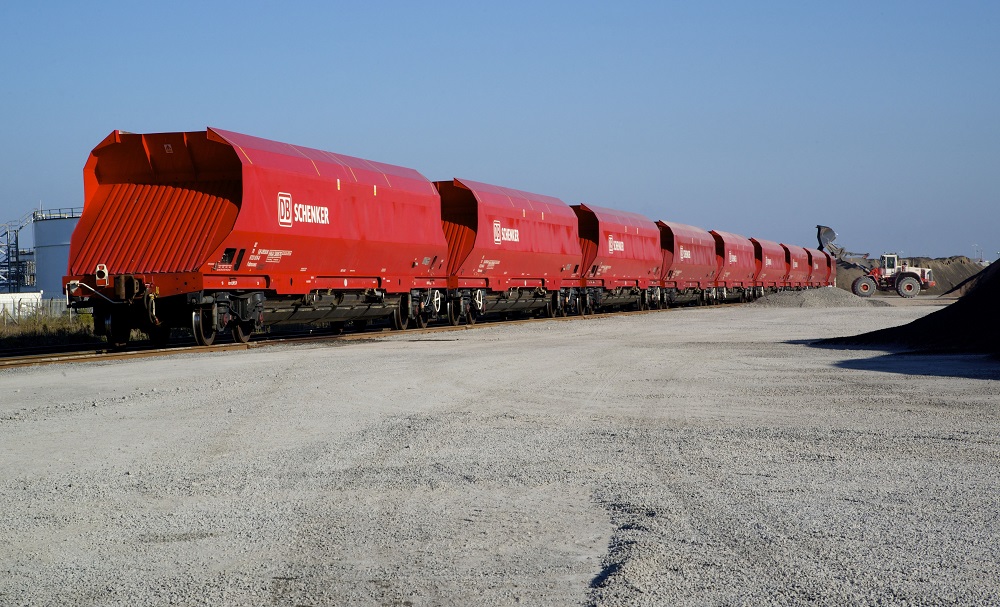A constructive month: DB Schenker Rail UK announces three new contract wins
29th October 2015

DB Schenker Rail UK has announced a triple win after securing contracts with construction companies United Asphalt, Brett Aggregates and J Clubb.
Each contract will see the UKs leading rail freight operator transport aggregates across the UK, providing a more eco-friendly alternative to road transportation. The deals will save 2 million road miles each year.
DB Schenker Rail UK has secured a five year contract with United Asphalt to transport hard stone aggregate from Ipswich Docks and Avonmouth Docks to Theale, Berkshire and is the first time that imported hard stone has been moved from Ipswich Docks by rail.
Three services will be completed each week, carrying approximately 1,300 tonnes of aggregate per train. The first service ran from Avonmouth Docks on 12 October carrying specialist skid resistant aggregates imported from Belfast.
United Asphalt, an independent asphalt manufacturing business producing quality assured asphalt, macadam and specialist surfacing products, is purchasing rail services directly for the first time. The introduction of DB Schenkers rail freight service means that up to 135 lorry loads will be removed from the roads each week, leading to a significant reduction in CO2 emissions.
David Fletcher, Head of Construction Sales at DB Schenker Rail UK, said:
This is the first time that United Asphalt has directly purchased rail transport and we are delighted they have selected DBSR UK to provide these services.
As the leading supplier of rail services to the construction sector this is an exciting project and we are already working with United Asphalt on additional rail services.
Brett Aggregates, one of the largest independent producers of sand and gravel in the UK, has also chosen DB Schenker Rail UKs services, in a 10 year contract.
The new deal will see the rail freight operator moving aggregates, for use in the production of concrete, from Cliffe, Kent to Brett Aggregates new railhead in Neasden, North London.
Brett Aggregates has been working with DB Schenker Rail UK for around three years to open this facility, which will allow the delivery of aggregates into central London without using road transport.
The new service, which commenced 14 October, will run at a rate of two trains per week carrying approximately 1,300 tonnes of material per train, the equivalent of around 90 lorry loads.
Brett Aggregates provides a wide range of traditional and recycled products from 32 quarry sites and wharves in London, the South East and East of England.
Our partnership with Brett Aggregates provides an efficient and eco-friendly way to transport material into the capital said David Fletcher.
We have been successfully operating the Ipswich to Watford traffic for Brett Aggregates since 2013 and the development of services to the new Neasden railhead further strengthens our relationship with them.
Adding to their success DB Schenker Rail UK has also started a contract with J Clubb this month, transporting ash from West Burton Power Station, Nottinghamshire to East Peckham, Kent.
The new six year deal will see DB Schenker Rail UK operate two trains per week, transporting around 1,200 tonnes of product per train. The ash is used in the production of concrete blocks, an eco-alternative to tipping the ash for waste.
The initiation of this contract follows the work by J Clubb to reinstate the former East Peckham railhead to handle such traffic. The first service arrived at the railhead on 14 October and was the first regular rail traffic through the site for at least 10 years.
Jon Clarke, Account Manager at DB Schenker Rail UK, said:
We are very pleased to be working in partnership with J Clubb to deliver product to the newly reinstated East Peckham Railhead site.
The closure of coal fired power stations in Kent has meant alternative sources needed to be identified. Using rail freight to transport the aggregates removes around 170 lorry loads from road transport each week.

